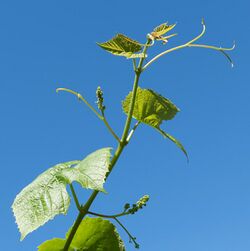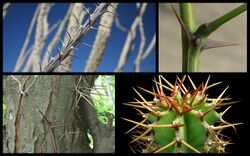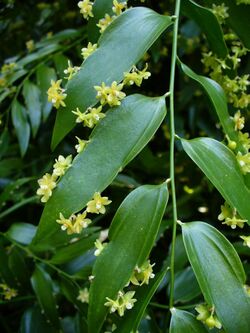Biology:Aerial stem modification



Aerial stem modifications are modifications to the aerial stems,[1] vegetative buds and floral buds of plants growing in different conditions and which perform functions such as climbing, protection, support, synthesis of food, or vegetative propagation.[2][3] Aerial stem structures that undergo modifications to perform these special functions include tendrils, thorns, hooks, phylloclade, tuberous stems, and bulbils.[4][5][6] The auxiliary or the terminal part of the modified structures shows their stem nature.[7]
Tendrils
Some weak-stemmed plants produce wiry, coiled, sensitive, and delicate organs for climbing. They are called tendrils.[8] These may develop from either the axillary bud or the terminal bud of the stem. In Passiflora, the tendrils develop from the axillary bud. In Cissus quadrangularis and in Vitis vinifera, the terminal bud develops into tendrils.[9][10][11]
Thorns
These are hard, woody, pointed structures meant for protection. They are provided with vascular tissue,[12] which may develop from the axillary bud or terminal buds.[13] They control transpiration by reducing the vegetative growth. In Bougainvillea, Punica granatum, and Duranta, the axillary bud develop into thorns.[14][15][16][17] In Duranta, the thorns are provided with leaves and flowers. In Punica granatum, the thorns bear leaves and branches.[18] In Carissa carandas, the terminal bud produces a pair of thorns. They help in protection.[19]
Bulbils
When the axillary bud becomes fleshy and rounded due to the storage of food, it is called a bulb.[20] It gets detached from the plant, falls on the ground, and develops into a new plant. e.g. Dioscorea.[21] It is in the axil (the space between the leaf and stem).[22]
Cladode
These are green branches of limited growth (usually one internode long) that have taken up the functions of photosynthesis.[23] True leaves are reduced to scales or spines, e.g. Asparagus.[24]
References
- ↑ Lal, Uma Ranjan; Monika; Kotagiri, Ravikant (2022-04-30). "Pharmacognostic specifications of Abroma augusta stems and Cissus quadrangularis aerial part". The Journal of Phytopharmacology 11 (2): 133–136. doi:10.31254/phyto.2022.11215. ISSN 2320-480X.
- ↑ "Enzymatic Synthesis of Food Additives", Trends in Food Engineering (CRC Press): pp. 323–334, 2000-06-07, doi:10.1201/9781482279085-36, ISBN 9780429181733, http://dx.doi.org/10.1201/9781482279085-36, retrieved 2023-09-23
- ↑ Rubber budding & vegetative propagation. [s.n.]. 1920. doi:10.5962/bhl.title.152642. http://dx.doi.org/10.5962/bhl.title.152642.
- ↑ "Tuberous Medicinal Plants of India: Biology and Biotechnology", Bulbous Plants (CRC Press): pp. 319–345, 2016-04-19, doi:10.1201/b16136-20, ISBN 9780429167904, http://dx.doi.org/10.1201/b16136-20, retrieved 2023-09-23
- ↑ "Stellar Tendrils", After and Before the Lightning (University of Arizona Press): pp. 97, 2022-08-16, doi:10.2307/j.ctv2vt022b.162, http://dx.doi.org/10.2307/j.ctv2vt022b.162, retrieved 2023-09-23
- ↑ "phylloclade, n.", Oxford English Dictionary (Oxford University Press), 2023-03-02, doi:10.1093/oed/7789702023, http://dx.doi.org/10.1093/oed/7789702023, retrieved 2023-09-23
- ↑ DeWitt, Natalie; Baker, Monya (2007-06-07). "Welcome to Nature Reports Stem Cells". Nature Reports Stem Cells. doi:10.1038/stemcells.2007.2. ISSN 1754-8705.
- ↑ Hickey, Michael; King, Clive (2000-11-16) (in en). The Cambridge Illustrated Glossary of Botanical Terms. Cambridge University Press. ISBN 9780521794015. https://books.google.com/books?id=0Yja1lL_pJYC&pg=PA41.
- ↑ Data S1: Additional Cissus quadrangularis chromosome images. doi:10.7717/peerj.8201/supp-1.
- ↑ Adam, Albert (2012), "Vitis vinifera sylvestris et Vitis vinifera vinifera", In Vino Veritas (Presses de l’Université de Montréal): pp. 15–16, doi:10.4000/books.pum.7865, ISBN 9782760630994, http://dx.doi.org/10.4000/books.pum.7865, retrieved 2023-09-23
- ↑ Paniagua-Zambrana, Narel Y.; Bussmann, Rainer W.; Romero, Carolina (2020), "Passiflora caerulea L. Passiflora edulis L. Passiflora ligularis Juss. Passiflora mollissima (Kunth) L.H. Bailey Passiflora punctata L. Passiflora quadrangularis L. Passifloraceae", Ethnobotany of the Andes, Ethnobotany of Mountain Regions, Cham: Springer International Publishing, pp. 1–15, doi:10.1007/978-3-319-77093-2_221-1, ISBN 978-3-319-77093-2, http://dx.doi.org/10.1007/978-3-319-77093-2_221-1, retrieved 2023-09-23
- ↑ Shoji, Toshihiro; Breuer, Christopher; Shinoka, Toshiharu (2020), "Tissue-Engineered Vascular Grafts for Children", Tissue-Engineered Vascular Grafts (Cham: Springer International Publishing): pp. 533–548, doi:10.1007/978-3-030-05336-9_19, ISBN 978-3-030-05335-2, http://dx.doi.org/10.1007/978-3-030-05336-9_19, retrieved 2023-09-23
- ↑ "6309 terminal bud [n]", Encyclopedic Dictionary of Landscape and Urban Planning (Berlin, Heidelberg: Springer Berlin Heidelberg): pp. 1018, 2010, doi:10.1007/978-3-540-76435-9_14594, ISBN 978-3-540-76455-7, http://dx.doi.org/10.1007/978-3-540-76435-9_14594, retrieved 2023-09-23
- ↑ Duranta. 2022-01-07. doi:10.1079/cabicompendium.20191. http://dx.doi.org/10.1079/cabicompendium.20191. Retrieved 2023-09-23.
- ↑ "POMEGRANATE (Punica granatum)(Punica granatum)", Westcott's Plant Disease Handbook (Dordrecht: Springer Netherlands): pp. 1032, 2008, doi:10.1007/978-1-4020-4585-1_2421, ISBN 978-1-4020-4584-4, http://dx.doi.org/10.1007/978-1-4020-4585-1_2421, retrieved 2023-09-23
- ↑ Seybold, A. (1929), "Energetische Messungen der pflanzlichen Transpiration", Die physikalische Komponente der Pflanzlichen Transpiration (Vienna: Springer Vienna): pp. 129–157, doi:10.1007/978-3-7091-9851-3_3, ISBN 978-3-7091-9604-5, http://dx.doi.org/10.1007/978-3-7091-9851-3_3, retrieved 2023-09-23
- ↑ Rojas-Sandoval, Julissa (2020-11-09). Bougainvillea spectabilis (great bougainvillea).. doi:10.1079/isc.9640.20203482916. http://dx.doi.org/10.1079/isc.9640.20203482916. Retrieved 2023-09-23.
- ↑ "POMEGRANATE (Punica granatum)(Punica granatum)", Westcott's Plant Disease Handbook (Dordrecht: Springer Netherlands): pp. 1032, 2008, doi:10.1007/978-1-4020-4585-1_2421, ISBN 978-1-4020-4584-4, http://dx.doi.org/10.1007/978-1-4020-4585-1_2421, retrieved 2023-09-23
- ↑ Carissa carandas (caranda (plum)). 2022-01-07. doi:10.1079/cabicompendium.13652. http://dx.doi.org/10.1079/cabicompendium.13652. Retrieved 2023-09-23.
- ↑ Bickle, Ian (2014-02-15), "Phthisis bulbi", Radiopaedia.org, doi:10.53347/rid-27686
- ↑ "YAM, CINNAMON-VINE (Dioscorea)Cinnamon-Vine (Dioscorea)", Westcott's Plant Disease Handbook (Dordrecht: Springer Netherlands): pp. 1143, 2008, doi:10.1007/978-1-4020-4585-1_2758, ISBN 978-1-4020-4584-4, http://dx.doi.org/10.1007/978-1-4020-4585-1_2758, retrieved 2023-09-23
- ↑ Schulenburg, Axel; Marian, Brigitte (2012-07-15), Normal and Neoplastic Stem Cells, Weinheim, Germany: Wiley-VCH Verlag GmbH & Co. KGaA, doi:10.1002/3527600906.mcb.201100020, ISBN 978-3527600908, http://dx.doi.org/10.1002/3527600906.mcb.201100020, retrieved 2023-09-23
- ↑ Hickey, Michael; King, Clive (2000-11-16) (in en). The Cambridge Illustrated Glossary of Botanical Terms. Cambridge University Press. ISBN 9780521794015. https://books.google.com/books?id=0Yja1lL_pJYC&pg=PA8.
- ↑ "ASPARAGUS (Asparagus officinalis)(Asparagus officinalis)", Westcott's Plant Disease Handbook (Dordrecht: Springer Netherlands): pp. 734, 2008, doi:10.1007/978-1-4020-4585-1_1522, ISBN 978-1-4020-4584-4, http://dx.doi.org/10.1007/978-1-4020-4585-1_1522, retrieved 2023-09-23
 |
